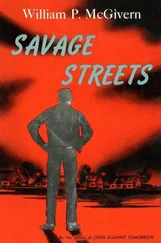“All right. I have to make a couple of local calls first,” he said. “I’m trying to track down Doobie Gordon. Then I’ll call Motors.”
He hesitated, his hand on the bedroom knob. “Forgive me, Bonnie,” he said, “but I’m going to close this door. I know we’re both on the same side, but I’m cops and you’re press. If I do reach Doobie, what I’ve got to say is police business, private. I’m onto something about these dead soldiers. It will be your story first, I promised you that, but I don’t want you obligated to Larry Malloy till we’ve done our police work, okay?”
Bonnie Caidin nodded and he closed the bedroom door behind him. She thought of turning up the kitchen radio but instead she moved closer to the windows, letting the hum of street traffic float up and mask out the drone of Mark Weir’s voice in the bedroom.
First there seemed to be two conversations, low and short, then she could make out a longer series of digits being dialed and knew he was calling Motors Registration in Springfield. There were murmurs and pauses, then a longer murmur of Weir’s voice and a pause as he listened.
When Weir emerged from the bedroom, his expression was thoughtful and withdrawn, almost as if she were not in the room. “Something wrong? You couldn’t locate Doobie?” she asked.
He shook his head. “No, I couldn’t. But that’s not what’s worrying me.” He glanced at his watch, then joined her at the window, putting both hands on her shoulders and turning her slim body to face him squarely.
“Listen, Bonnie, and listen good. I told you I was onto something. Well, Durham Lasari may be part and parcel of the whole thing. I can’t explain now, but I want to meet with him. I’ll get back here by 6 A.M. That should give me time to do what I’ve got to do.”
As Bonnie began to speak, Mark held up his hand, “You’re listening, baby, I’m talking. When Lasari calls you from Calumet, tell him to come here. Tell him not to let anyone know where he’s going and to be sure he’s not being followed. Keep him here till morning, till I get back to you. Don’t go out, don’t let anyone in.”
“What if he won’t come?”
“Convince him, Bonnie, for his own good.”
“Then someone did check him out at Motors?”
“Yes,” Lieutenant Weir said. “A detective from Headquarters checked the plate this morning, early. I know who this man is and who he pals around with. It’s part of a damned jigsaw, but it’s falling into place.”
Weir pulled on his damp raincoat. “I squeezed some fresh orange juice,” Caidin said. “Want to drink it down right now, Vitamin C and all that?”
Weir shook his head. “I’ll have it for breakfast, okay? And Bonnie, once Lasari is here, keep the door bolted from the inside, understand?”
“I understand, Mark,” she said, “but I also understand you’re holding out on me. You were on that phone to Springfield just too damned long. So who else called Motors about Lasari today?”
“I know you’re going to have to tell him about the cop to get him up here, but the next one’s strictly between you and me, Bonnie. Do I have your word on that?”
When she nodded, Weir said, “There was a second call, around 3 P.M., a confidential request from a government agency. I’m not authorized to ask who or what on that one, Bonnie.” He frowned. “I sure as hell hope I’m not making a mistake in telling this, even to you, but that call was an A-1 priority level request from Washington. Your Durham Lasari is suddenly a very important person.”
When the lieutenant left, Bonnie bolted the door and went to sit on the edge of the bed. She began to rehearse quickly what she wanted to say when the phone rang from Calumet City. She wanted to get the words right the first time.
It had been a pleasant enough day, Tarbert Weir thought, even with Mark’s unexpected phone call and the puzzling request for help. Several times the general had tried to reconstruct that conversation, first in his head and later aloud to John Grimes.
“... all right, general, all right. What you’re telling me is that my problem isn’t your problem, there is nothing you can do.”
“... what I’m saying is that there is nothing I will do... there’s a difference.” General Weir was sure those were the words he’d used, but his son had interrupted abruptly, pained and angry, before he had had a chance to explain.
The sound of Mark’s voice, mature, vibrant, had unnerved the general and set loose a flood of memories.
He would have liked to talk longer, find out more about what was troubling Mark. He didn’t even have his son’s home phone number, but he supposed the lieutenant was listed. There couldn’t be more than one Mark Weir in the Chicago police department.
The six o’clock news had predicted rain, possibly turning to snow for the suburban areas, but here the night was clear with the pale winter moon in a windless sky.
General Weir stood on the porch of his farmhouse in Logan County, outside Springfield, and watched the shift of gray light over the cornfields. The stalks had been broken at almost uniform angles by the snow and looked to Scotty Weir like troops lined up in a ragged formation, stretching down to the small lake at the base of the meadow, a black flash of water rimmed by a stand of bare trees. A sparrowhawk circled toward its nest, wingtips white in the gathering darkness.
The general sipped his drink, trying to relish the bite of the whiskey with which he had become accustomed to ending his day. Usually the liquor brought with it a welcomed release, the knowledge that this day had few more hours to fill.
Early that morning he had helped the tenant farmer dig fence post holes and string new wire along the road at the side of the property. Weir expected to add two dozen new heifers to the milk herd in the spring. He had written out checks for winter feed bills, looked over the blueprints for the expansion of the new milking shed and run a personal check on the silo temperature of the field com and sorghum silage. Before lunch he fished for bluegills and pan bass through the soft lake ice near the springhouse, then took the new Irish setter for a run through the woods.
General Weir liked movement and speed and exercise, and he savored the rough, underfoot resilience of country terrain. It reminded him of army maneuvers, bivouacs in Germany and Korea, his basic training along the piny trails of Georgia. Now he tramped the farm woods in the new snow, even more than he did in the green of spring and summer or in the fall pheasant season. His wife had died because of his love for her, and of snow, but beneath the guilt and pain there was something soothing in remembering Maggie in the whiteness and silence and ecstasy of the last night they had ever spent together, in the lodge in the Bavarian Alps.
Grimes had cleaned and panfried the lake fish, bringing the general’s lunch on a tray to his study. Later Weir had driven to the country club where he won seventy dollars playing five card stud with Laura Devers. She’d asked if he’d like to go with her to look over a miniature Shetland she was thinking of purchasing for her granddaughter, but he declined. Mrs. Devers said she’d call about dinner.
He spent the rest of the daylight hours driving on backroads through the flat, snow-streaked Illinois countryside, trying to let the black and gray landscape soothe the unrest, the loneliness which, if uncontrolled, could grow and wrench through his insides like a twisting rasp. Damn Mark’s phone call...
He had been lonely and poor and hard-worked as a farm boy in this same country before he’d faked his age to join the Army at seventeen. The Army, its disciplines and rewards, had become his mentor and ultimately his life. As a teenager, he had been a quiet but brilliant student. In the Army he studied and broadened his horizons, taking advantage of every specialization program offered, from language school at Monterey through the Army College at Carlisle, Pennsylvania, and administration studies at Indianapolis. There had been deep satisfaction, a strong sense of accomplishment and pride as he worked his way through Army ranks from stripes to stars.
Читать дальше












